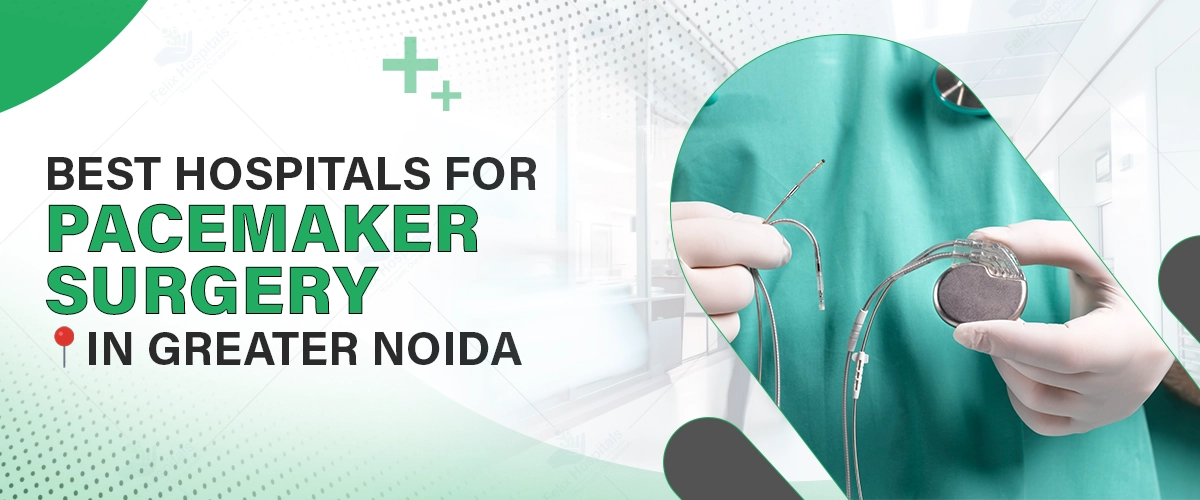
Subscribe to our

Cardiovascular health is an integral part of one's overall well-being. In patients who have been diagnosed with arrhythmias or other cardiac rhythm disturbances, a pacemaker is a revolutionary option. Such small battery-operated pacemakers track heartbeat, enabling individuals to live more stable and productive lives.
Over the past couple of years, Greater Noida has become a prospective hub for sophisticated cardiac procedures, such as pacemaker implantation. If you and your loved one are planning to undergo the procedure, it is critical to select the appropriate healthcare facility to ensure medical safety and peace of mind during the recuperation process.
Take control of your cardiac well-being—stop by a reputable cardiac facility in Greater Noida today for early screening and tailored care.
Greater Noida has seen rapid growth in medical infrastructure. Now, it boasts many multispecialty and super specialty hospitals with state-of-the-art technology for cardiac care. The place provides a combination of quality care, affordability, and accessibility that attracts patients from Delhi NCR and beyond.
Following are some reasons why Greater Noida’s hospitals are ideal for cardiac treatments:
Latest Infrastructure: Cardiac catheterization facilities and state-of-the-art operating suites exist in most of the hospitals.
Specialized Cardiac Teams: Right from diagnosis to rehabilitation, the centers have trained cardiology and cardiac surgery personnel.
Accessibility: It is a conveniently located area in close proximity to the capital and easily connected, which makes it an easily accessible center for patients in the region.
Hospital choice for pacemaker implantation is important in order to have a trouble-free procedure and smooth recovery. Among the most important factors that lead to quality and efficient care in such hospitals are:
1. State-of-the-Art Diagnostic Equipment
Proper diagnosis is the stepping stone for successful management. Well-known hospitals have sophisticated testing centers such as ECG, Holter monitoring, echocardiography, and cardiac stress tests to assess the extent of rhythm disorders.
2. State-of-the-Art Operation Theatres
Availability of advanced, clean, and well-equipped operation theatres, particularly cardiac catheterization labs and real-time monitoring facilities, enhances the accuracy and safety of surgery in pacemaker implantation.
3. Emergency & Critical Care Support
Round-the-clock ICUs, latest emergency services, and trained support staff are required in managing intraoperative or postoperative complications, particularly in those with complex cardiac backgrounds.
4. Post-Surgery Cardiac Rehabilitation
Recovery does not end with the procedure. The best hospitals have structured cardiac rehabilitation programs with physiotherapy, nutritional counseling, psychiatric care, and medication management to promote long-term cardiovascular health.
5. Patient-Centered Services
Patient experience-focused hospitals—providing clear communication, affordability, insurance assistance, and follow-up visits—are more likely to provide successful results and increased overall satisfaction.
Together, these attributes turn a hospital from a simple surgical facility—they turn it into a reliable partner in your cardiac care process.
Caregivers or patients must ask before deciding:
What is the hospital's pacemaker surgery success rate?
Are diagnostic and surgery fees clear?
Does the facility provide cashless insurance or government health schemes?
How is post-operative care organized?
The cost of pacemaker surgery in Greater Noida is dependent on many factors including:
Type of pacemaker (single, dual, or triple chamber)
Hospital stay duration
Pre- and post-operative investigations
Selection of general or private room facility
The average cost on an estimate could be anywhere from INR 1.5 lakh to INR 5 lakh, which is typically lesser than metro cities but of the same quality.
Read Reviews and Ratings: Online ratings and patient reviews can give an indication of hospital performance.
Tour the Facility: If at all possible, visit the hospital to get a gauge on cleanliness, staff attitude, and overall comfort.
Request a Second Opinion: It's always a good idea to ask another specialist before having surgery.
Don't wait until symptoms worsen—make an appointment for a heart rhythm analysis and learn more about safe, expert-assisted pacemaker surgery in your area.
Greater Noida has emerged as a center of quality heart care with trustworthy facilities to be found for those who need pacemaker surgery. There could be certain names, but the secret lies in getting a hospital that has the optimal combination of infrastructure, expertise, and loving demeanor. Always opt for safety, comfort, and full recovery while selecting your choice.
If you or your loved one is experiencing symptoms such as fatigue, spells of fainting, or abnormal heart rhythm, don't hesitate and get a consultation. Early diagnosis and the proper facility will bring rhythm back to your heart and life.
Q- How can I ensure if I actually need a pacemaker or my condition can be treated with medication?
Ans: A competent cardiologist can make a decision regarding the requirement of a pacemaker by ECG, Holter recording, and symptomatic assessment. In some instances, medication is sufficient to treat arrhythmias without surgery.
Q- Can I lead a normal life after receiving an implanted pacemaker?
Ans: Yes, the majority of patients resume normal activities within weeks. You may be asked to stay away from strong magnetic fields or certain demanding exercises, depending on the advice of the doctor.
Q- How long does a pacemaker last before needing replacement?
Ans: The battery of a pacemaker will last around 7 to 10 years. Your cardiologist will monitor its functioning on follow-up visits and suggest replacement as needed.
Q- What is post-surgery care or rehabilitation like after pacemaker implantation?
Ans: This is usually in the form of wound care, follow-up appointments for device programming, cardiac rehab, medication titration, and lifestyle modifications.
Q- Is pacemaker surgery safe in comorbid patients or the elderly?
Ans: Yes, if it is done in a well-equipped center, pacemaker surgery is low-risk even in comorbid patients or the elderly, provided pre-surgical assessment is adequate.
Q- Do pacemakers exist for various heart conditions?
Ans: Yes, based on your diagnosis, your cardiologist can prescribe a single-chamber, dual-chamber, or biventricular (CRT) pacemaker for maximum function.
Q- What do I ask during my initial consultation at a hospital for pacemaker surgery?
Ans: Inquire about the hospital's experience with pacemaker implantation, the type of devices they have, the likely recovery time, cost structure, and emergency services availability.